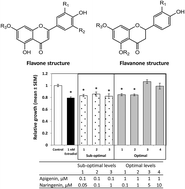Enhanced action of apigenin and naringenin combination on estrogen receptor activation in non-malignant colonocytes: implications on sorghum-derived phytoestrogens†
Abstract
Activation of estrogen receptor-β (ERβ) is an important mechanism for colon cancer prevention. Specific sorghum varieties that contain flavones were shown to activate ER in non-malignant colonocytes at low concentrations. This study aimed to determine positive interactions among estrogenic flavonoids most relevant in sorghum. Apigenin and naringenin were tested separately and in combination for their ability to influence ER-mediated cell growth in non-malignant young adult mouse colonocytes (YAMC). Sorghum extracts high in specific flavanones and flavones were also tested. Apigenin reduced ER-mediated YAMC cell growth comparable to physiological levels of estradiol (E2, 1 nM) at 1 μM; naringenin had similar effect at 10 μM. However, when combined, 0.1 μM apigenin plus 0.05 μM naringenin produced similar effect as 1 nM E2; these concentrations represented 1/10th and 1/200th, respectively, of the active concentrations of apigenin and naringenin, demonstrating a strong enhanced action. A sorghum extract higher in flavones (apigenin and luteolin) (4.8 mg g−1) was more effective (5 μg mL−1) at activating ER in YAMC than a higher flavanone (naringenin and eriodictyol) (28.1 mg g−1) sorghum extract (10 μg mL−1). Enhanced actions observed for apigenin and naringenin were adequate to explain the level of effects produced by the high flavone and flavanone sorghum extracts. Strong positive interactions among sorghum flavonoids may enhance their ability to contribute to colon cancer prevention beyond what can be modeled using target compounds in isolation.


 Please wait while we load your content...
Please wait while we load your content...